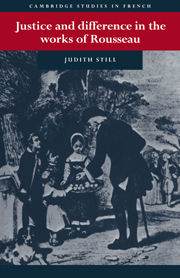Book contents
- Frontmatter
- Contents
- Acknowledgements
- A preliminary note on vocabulary and conventions
- Introduction
- Chapter 1 The problem: the intersection of beneficence and pudicity
- Chapter 2 The code of beneficence
- Chapter 3 The practice of beneficence and model benefactors in the major works
- Chapter 4 The passion of pity in Rousseau's theory of man
- Chapter 5 Gyges' ring: a reading of Rousseau's 6e Promenade
- Chapter 6 Pudicity in some of Rousseau's minor writings: its relationship to beneficence
- Conclusion
- Appendix: Generosity and pudicity in Gyges und sein Ring and Le Roi Candaule
- Notes
- Bibliography
- Index
- Cambridge Studies in French
Appendix: Generosity and pudicity in Gyges und sein Ring and Le Roi Candaule
Published online by Cambridge University Press: 22 September 2009
- Frontmatter
- Contents
- Acknowledgements
- A preliminary note on vocabulary and conventions
- Introduction
- Chapter 1 The problem: the intersection of beneficence and pudicity
- Chapter 2 The code of beneficence
- Chapter 3 The practice of beneficence and model benefactors in the major works
- Chapter 4 The passion of pity in Rousseau's theory of man
- Chapter 5 Gyges' ring: a reading of Rousseau's 6e Promenade
- Chapter 6 Pudicity in some of Rousseau's minor writings: its relationship to beneficence
- Conclusion
- Appendix: Generosity and pudicity in Gyges und sein Ring and Le Roi Candaule
- Notes
- Bibliography
- Index
- Cambridge Studies in French
Summary
The relationships and oppositions which are so important in Rousseau's treatment of generosity and pudicity can be further elaborated with the help of some much more recent accounts of the myth of Gyges. Both Friedrich Hebbel and André Gide expanded the story of Gyges into a play, and these plays provide a useful imaginative commentary on the implications and assumptions of the classical source texts. Both plays, inspired by the myth, make a statement about generosity. Gide makes it explicit in a quotation from Nietzsche, in a footnote to his preface to Le Roi Candaule: ‘“Généreux jusqu'au vice,” écrit Nietzsche; et ailleurs: “C'est une chose curieuse à constater que l'excessive générosité ne va pas sans la perte de la pudeur.” La pudeur est une réserve.’ Gide also claims to have made a rare encounter with the spirit of emotional generosity which his Candaules displays in the works of Rousseau:
Je relève cette phrase des Confessions: ‘Enfin, de quelque violente passion que j'aie brûlé pour elle, je trouvais aussi doux d'être le confident que l'objet de ses amours, et je n'ai jamais un moment regardé son amant comme mon rival, mais toujours comme mon ami. On dira que ce n'était pas encore là de l'amour: soit, mais c'était donc plus.’ (Il s'agit ici de Mme d'Houdetot et de Saint-Lambert; il eût pu s'agir de Mme de Warens et de Claude Anet.) … L'expression de ce sentiment (qui est aussi celui de mon Candaule) – que je n'ai recontré que là – est de la plus haute importance.
(Journal 2/12/05)- Type
- Chapter
- Information
- Justice and Difference in the Works of RousseauBienfaisance and Pudeur, pp. 197 - 205Publisher: Cambridge University PressPrint publication year: 1993



